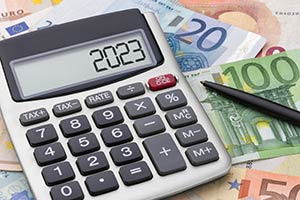Current
informs.
All news at a glance.

We keep you up to date
We bring you the latest developments and news directly to your screen!
Current dates and developments always in view.
Overview of the changes for 2023
Taxpayers can look forward to higher tax-free allowances and an improvement in the home office allowance in 2023.
The new year is regularly associated with numerous changes to tax law, and 2023 is no exception. Most of these changes are summarized in just two laws, the Annual Tax Act 2022 and the Inflation Compensation Act. For the most part, the changes at the turn of the year are positive for taxpayers.
A lot has changed in tax law, especially for property owners, including significant improvements for smaller photovoltaic systems. All these changes for current and future property owners are therefore summarized in a separate article. There is also a separate article for employers and employees because, as is usually the case, there have also been some changes to payroll tax and social security. Finally, another article covers the changes from the Annual Tax Act 2022, which have no place in this overview, for example because they will only come into force later or with retroactive effect. Here is an overview of the general changes at the turn of the year:
-
Basic allowance: The basic tax-free allowance, also known as the "tax-free minimum subsistence level", will increase by 561 euros to 10,908 euros.
-
Cold progression: The effect of "cold progression" is offset annually to ensure that wage increases are also reflected in employees' wallets. To this end, the benchmark values of the income tax rate will be increased by 7.2 % in line with expected inflation. This means that the top tax rate of 42 % will apply to EUR 62,810 in 2023 - an increase of EUR 4,213 compared to the previous year. The so-called "wealth tax" from EUR 277,836 is excluded from this adjustment.

-
Solidarity surcharge: In 2023, for the first time since the partial abolition of the solidarity surcharge, the tax-free amount will be increased from the previous EUR 16,956 to EUR 17,543 (EUR 35,086 instead of EUR 33,912 for joint assessment). The tax-free amount does not relate to the taxable income, but to the assessed income tax. The solidarity surcharge is therefore only payable if the income tax is higher than the tax-free amount. The adjustment of the tax-free amount means that only the ten percent of the highest income will continue to be subject to the solidarity surcharge.
-
Child support: Child benefit was increased to 250 euros per month for the first, second and third child on January 1, 2023. From the fourth child onwards, it was already 250 euros. This corresponds to an increase of 31 euros for the first and second child and 25 euros for the third child. As a result of the new increase, parents will receive 250 euros in child benefit per month for all children from 2023.
-
Child allowance: Corresponding to the increase in child benefit, the child allowance will also rise by 202 euros per parent to 3,012 euros for 2023. However, the allowance for childcare and education needs of 1,464 euros will remain unchanged.
-
Education allowance: The allowance for the special needs of an adult child in vocational training who is living away from home and is entitled to child benefit will be increased from EUR 924 to EUR 1,200 per calendar year from 2023.
-
Single parents: The relief amount for single parents will be increased by 252 euros to 4,260 euros in 2023.
-
Maximum maintenance amount: Like the basic tax-free allowance, the maximum amount for the deduction of maintenance payments will rise to €10,908. Previously, this maximum amount was always increased together with the basic tax-free allowance, but in 2022, instead of adjusting the maximum amount separately, a reference to the applicable basic tax-free allowance was simply included in the law.
-
Retirement plan: The full deduction of special expenses for pension expenses, which was previously only planned for 2025, has been brought forward to 2023 due to the rulings of the Federal Fiscal Court on the double taxation of pensions. Full deductibility from 2023 means that deductible pension expenses will increase by 1TP3k in 2023 and by 1TP3k in 2024.
-
Artists' social security contribution: After years of constant contributions, the social security contribution rate for artists was raised to 5.0 % for 2023. The artists' social security contribution rate has remained unchanged at 4.2 % since 2018. This was ensured by additional federal subsidies in 2021 and 2022, some of which will continue in 2023. In view of the economic damage to the arts and culture industry as a result of the pandemic, the levy rate for 2023 would otherwise actually have had to be raised to 5.9 %.
-
Savings lump sum: In 2023, the saver's lump sum will increase from 801 to 1,000 euros for single taxpayers and from 1,602 to 2,000 euros for joint taxpayers. In order to keep the increase in the lump sum as simple as possible, exemptions already granted will be automatically increased by just under 25 %.
-
Home Office Flat Rate: Previously, the home office allowance was limited until the end of 2022. The lump sum will now not only remain in place permanently, but will also be significantly improved. Instead of 5 euros, 6 euros per day can be deducted from 2023. In addition, the maximum deduction has been increased from 600 euros to 1,260 euros per year, which corresponds to 210 days of work from home per year. Anyone who carries out several home office activities must divide both the daily flat rate and the maximum amount between the various activities. Multiple application of the lump sum is therefore not permitted.

The deduction of the home office allowance is possible regardless of whether the activity is carried out in a work corner or in the home office and regardless of whether it is the center of the professional activity or another workplace exists. If no other workplace is permanently available for the activity, the home office lump sum can also be deducted if the activity is carried out away from home or at the first place of work on the same day and the commuting allowance or travel expenses are claimed for this.
-
Home office: Anyone who can claim a home office for tax purposes must also prepare for changes from 2023. If there is simply no other workplace available, the previous deductibility of the home office will no longer apply. Instead, the home office flat rate will now apply in these cases, which has been extended to include a provision for the absence of another workplace. In contrast to the previous regulation, the costs are now only deductible to the extent of the previous maximum amount of EUR 1,250 if the conditions for the home office allowance are met on 210 working days per year. However, there is no longer any need to prove that the study is used almost exclusively for business purposes because, unlike the previous study regulation, the home office allowance has no comparable restrictions. If, on the other hand, the home office is the center of all activities, the expenses can be claimed in full as business expenses or income-related expenses, as before. Alternatively, taxpayers can now claim an annual lump sum of EUR 1,260 (identical to the maximum annual home office lump sum) for tax purposes, regardless of proof of actual costs. The annual lump sum is person-related and can therefore be claimed by several people in the same household, even if they use the study together. However, if the study is used for several activities by the same taxpayer, the lump sum can only be deducted once in total. In addition, the lump sum is to be reduced by one twelfth for each month in which the study is not the center of the professional activity.
-
Depreciation: As part of the coronavirus economic stimulus package, a declining balance method of depreciation of up to 25 %, but no more than two and a half times the straight-line depreciation, was also possible for movable fixed assets acquired or manufactured in 2020 and 2021. This declining-balance depreciation was subsequently extended by one year, but now expired as planned at the turn of the year, meaning that only straight-line depreciation is possible again for assets acquired or manufactured in 2023.
-
Non-interest-bearing liabilities: Previously, non-interest-bearing liabilities with a remaining term of at least twelve months were to be discounted at an interest rate of 5.5 %. Due to the low-interest phase, this discounting requirement has been removed for financial years ending after December 31, 2022. If the financial year is identical to the calendar year, the change therefore applies for the first time for 2023, but can also be applied to earlier financial years on request. However, the discounting requirement for provisions with a remaining term of at least twelve months has not changed. These must therefore continue to be discounted at a rate of 5.5 %.
-
Individual vehicle taxation: Anyone who buys a new vehicle in another EU country for private or other non-business purposes must pay VAT on this purchase in Germany. For this so-called individual vehicle taxation, the buyer must submit a VAT return to the tax office within ten days of the purchase and pay the VAT. In addition to the previous paper return, there will also be an electronic submission option for this VAT return for individual vehicle taxation from 2023.
-
Electric company car: In order to receive the tax concessions for company car taxation, plug-in hybrid vehicles must have a certain minimum range using only the electric drive. This minimum range depends on the date of purchase and initial registration and was 40 kilometers until the end of 2021. Since January 1, 2022, a minimum range of 60 kilometers applies. According to current legislation, this value is to remain in place until the end of 2024 and then increase to 80 kilometers. However, the traffic light coalition had agreed to raise the minimum range to 80 kilometers from 1 August 2023, even though the law has not yet been changed.
-
Gas & heat price brake: Similar to the energy price lump sum, the relief granted by the federal government as part of the gas and heating price brake for the month of December 2022 (assumption of the advance payment or comparable benefit) is also subject to taxation. The benefit is classified as other benefits unless it is directly attributable to another type of income. However, the tax-free limit of EUR 256 for other benefits does not apply to the December benefit. Instead, the extent of the tax liability in the case of taxation as other benefits depends on the individual income. Only if the taxable income in 2022 was over 66,915 euros (over 133,830 euros for jointly assessed persons) will there be any pro rata taxation at all. There is also a mitigation zone to avoid a jump in the tax burden if the income limit is exceeded: December assistance is only fully taxable from an income of 104,009 euros (208,018 euros for jointly assessed persons).

-
Gastronomy: The reduced VAT rate in the catering sector was extended for a further year shortly before the turn of the year. This means that restaurant and catering services, with the exception of the supply of beverages, are subject to the reduced VAT rate of 7 % until at least December 31, 2023. A further extension during the course of the year is not unlikely, but is also not certain.
-
Flat-rate farmers: Due to EU requirements, the average rate for flat-rate farmers is now adjusted annually. For 2023, the average rate and the input tax flat rate will fall from 9.5 % to 9.0 %. In 2021, the average rate was still 10.7 %. For a farmer who is planning large investments with a correspondingly high input tax deduction potential, it may therefore be worthwhile not to apply average rate taxation.
-
External audits: As part of the implementation of an EU directive on the tax reporting obligations of digital platform operators, the regulations on external audits in the German Fiscal Code have also been fundamentally revised and modernized. This also includes the introduction of a qualified request for cooperation by the tax office and a cooperation delay fine in the event that the request for cooperation is not complied with. Most of these changes are to be applied for the first time in 2025, but then for the most part also for taxes that arose before 2025. However, from 2023, it will already be possible to request the submission of documents that must be recorded or retained within a reasonable period of time together with the audit order. If these documents have been created using a data processing system, the data must be provided in a machine-readable format. Once these documents have been submitted, the tax office should then inform the taxpayer of the intended focal points of the external audit, without this constituting a restriction of the external audit to certain matters.
-
Transparency register: Since August 1, 2021, many companies and associations have been obliged to register in the transparency register. The transitional period for registered partnerships, associations and other organizations that were not required to register at an earlier date also expired on 31 December 2022. This means that from 2023, all legal entities under private law and registered partnerships without exception will be obliged to notify the Transparency Register if there are any changes to the beneficial owners or other data subject to registration.
-
Crowdlending: A regulation on the deduction of capital gains tax on interest income from crowdfunding and crowdlending offers was introduced back in 2020. However, the regulation has proven to be incomplete and susceptible to all kinds of schemes and has therefore been fundamentally revised. The version applicable from 2023 is now intended to ensure that capital gains tax is withheld in all cases on the income generated by investors from crowdlending offers via internet platforms.
-
Nonprofit Organizations: Non-profit, charitable or church associations and other organizations have the option of flat-rate input tax for goods and services. The prerequisite is that the turnover subject to VAT from special-purpose businesses and other economic activities did not exceed a certain threshold in the previous year. This limit was raised from EUR 35,000 to EUR 45,000 at the turn of the year. The higher turnover limit must therefore be applied for the first time to turnover in 2022 (previous calendar year of 2023).
-
Entrepreneurship: From 2023, it will be clarified that entrepreneurial status within the meaning of VAT law is independent of whether the entrepreneur has legal capacity under other regulations. This means that, for example, fractional partnerships and other partnerships without legal capacity can now also have entrepreneurial status.
-
Public institutions: Due to requirements under EU law, the law stipulated years ago that legal entities under public law must pay VAT for certain services. However, due to the complexity of this change, a five-year transition period was granted, which was initially extended by two years due to the coronavirus pandemic. Instead of mandatory application from 2023, however, the transition period has now been extended again by two years, meaning that the change will not take effect until 2025.